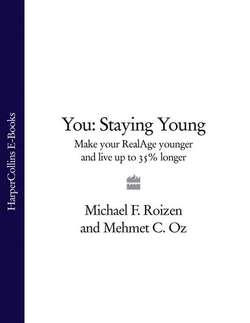Читать книгу You: Staying Young: Make Your RealAge Younger and Live Up to 35% Longer - Michael Roizen F. - Страница 32
Frazzle Dazzle: The Biology of Stress
ОглавлениеStress is good. There, we said it. Instead of calling us crazier than a four-headed firefly, hear us out. Stress heightens all of our biological systems so that we can deal with an impending threat, be it an enemy, a natural disaster or the fact that some idiot built the fire too close to the cave. Changes occur inside our body that give us the strength or the sense to fight a predator or hightail it out of there. What happens to your body during high-intensity stress? Your concentration becomes more focused than a microscope, your reaction time becomes faster, and your strength increases exponentially. Historically, stress was good – as long as you could survive it.
Yo-ga! Yo-ga! Yo-ga!
Yoga could very well be the ultimate de-stress technique. It lowers blood pressure and heart rate, decreases stress hormones and increases relaxation hormones like serotonin, dopamine and endorphins. You can get the benefits of yoga in a single pose or in a full-fledged class.
The big difference between stress today and stress yesterday isn’t the fact that cavemen didn’t have e-mail; it’s that their stress was fleeting. They had periods of high-intensity stress followed by low (or no) levels of it. Today we’re drowning in a sea of stress, with wave after wave after wave knocking us over. Those heightened biological reactions work in our favour for short periods, but when stress continues unabated, those biological reactions turn wacky.
Too much stress can lead to a host of ultimate stress-enders, like heart attacks, cancer and disabling accidents. Plus, stress destroys your sleep patterns, which can lead to unhealthy addictions to food and alcohol. How? Through a series of chemicals that are produced in your brain, travel through your blood and affect just about every system in your body.
That’s your stress circuit.
Specifically, your stress circuit is the interaction between your nervous system and your stress hormones – the hormonal system that sounds like a Star Wars galaxy: the hypothalamic-pituitary-adrenal (HPA) axis. The stress hormones cycle among these three glands in a feedback loop. When you’re faced with a major stressor like a mugger, a looming deadline or a chocolate shortage, the cone-shaped hypothalamus at the base of your brain releases CRH (corticotrophin-releasing hormone), which then does a hula dance on your pituitary gland, stimulating it to release another hormone called ACTH (adrenocorticotropic hormone) into your bloodstream.
ACTH signals your adrenal glands to release cortisol and facilitates production and then release of norepinephrine (also known as adrenaline, the fight-or-flight chemical). As you see in Figure 3.1, these four chemicals serve as your body’s SWAT team – they respond to emergencies. Adrenaline increases your blood pressure and heart rate, while cortisol releases sugar in the form of glucose to fuel your muscles and your mind. Then, to close the loop, cortisol travels back to the hypothalamus to stop the production of CRH. Stress over, hormones released, body returns to normal. But only if the stress stops as well.
